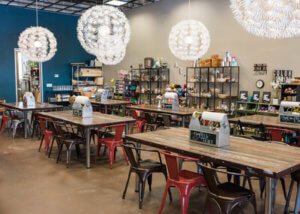Are you interested in opening your own crafting business? Maybe you want to help kids learn art, host paint and sip nights, or help guests create pottery.
Here at Pinspiration, we help creative entrepreneurs open their own craft studios through our franchise offering. Our franchise owners run DIY arts and crafts studios where customers can make paintings, home decor, accessories, and more. We are experts and the studio startup process. Below are some important considerations when getting started, and things that we provide our franchisees with detailed instructions and training on at Pinspiration:
1. Determine Your Craft Offering

In order to attract customers, you will need to determine a clear and specific product offering. Even if you decide to offer a wide variety of craft types, it is important that you have a central theme or message. At Pinspiration, we analyze data from sites like Pinterest to determine the trendiest crafts. Our customers know they can expect to find the hottest DIY projects they are seeing online in our stores.
2. Make it Simple for Your Customers
Customers are attracted to arts and crafts studios because they want the extra guidance and support throughout the creative process. It’s important that you carefully map out every aspect of the customer journey an ensure that it is simple and easy for your customers. Make sure to consider things like how customers book appointment check-in in, receive instructions and complete their projects. At Pinspiration locations, our franchisees provide our customers with iPad tutorials to walk them through their craft step-by-step, as well as friendly support staff to provide extra help.
It is important you consider how your services will be provided before even starting to think about the physical space; the details of your customer journey should dictate the type of studio you select.
3. Determine Your Branding
Another important consideration before looking for a location is your brand. Your brand should be consistent across your logo, online appearance, marketing materials, physical location, and products. Are you kitschy? upscale? quirky? contemporary? fun? polished? When determining your brand personality, ask yourself how you want your customers to feel when they are interacting with your brand.
4. Pick a Location

You have heard it a million times: “Location, location, location!” This is one of the most important aspects of studio launch, and also one of the most complex. You will have to consider things like lease duration, buildout, construction budget, drive-by traffic, walk-by traffic, center advertisement opportunities, permit requirements, and much, much more. It is usually worthwhile to partner with a seasoned real estate professional and hire a real estate attorney to review any lease before signing.
5. Set Up Marketing
To succeed as a local business, you will need a conversion-optimized, search-engine friendly website, a strong social media presence, optimized local listings, and much more. Research the best ways to promote businesses in your community, and start reaching out to other organizations and business owners who may be able to cross-promote with you.
6. Get Systems for EVERYTHING
Prior to opening, you need to vet and implement systems for inventory, point of sale, customer check-in, waivers, employees, pricing, customer relationship management, marketing, and more. You will likely need many different types of software to effectively run your business and should develop detailed checklists and documentation on all your systems for your team to follow.
7. Build a Team
Your business will only be as strong as your employees.

In a craft business, your customers will have many touchpoints with your team members. Everything from booking appointments to making the craft will involve person-to-person contact, and it will be the strength of employee-customer relationships that will keep customers coming back for more. Make sure to carefully map out all the desired qualities and skills for an employee, and conduct a thorough search for the perfect team members.
8. Test, Test, Test
Before opening, allow at least a couple weeks of time for testing. Service friends and family and make sure everything is running smoothly. Ask for lots of feedback from them on the experience and make frequent optimizations.
As you can see, starting a craft studio is no light undertaking. These are just some of the high-level considerations when getting started. Once your studio is up and running, it can be a highly rewarding (and fun!) career. If you are interested in opening a craft studio as a franchisee (and getting guidance, support, and resources on all the items listed above), we would love to chat with you – get more information and reach us here.
